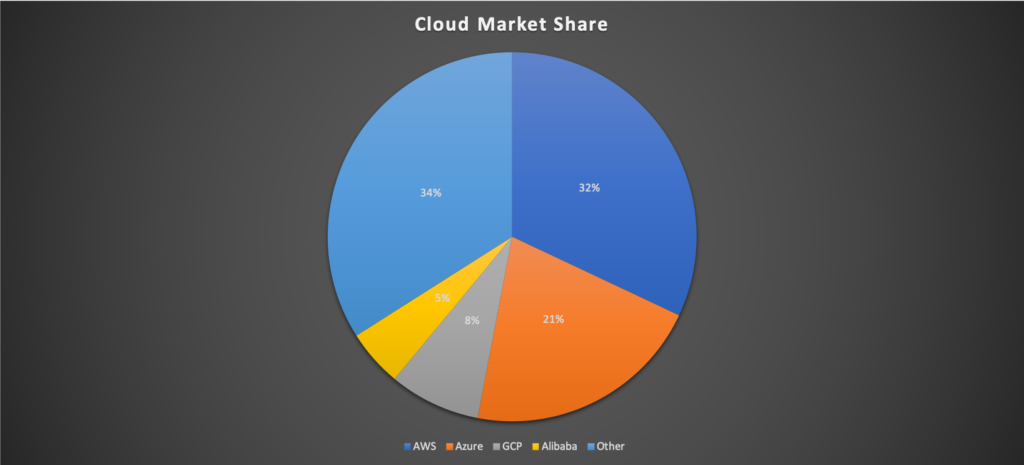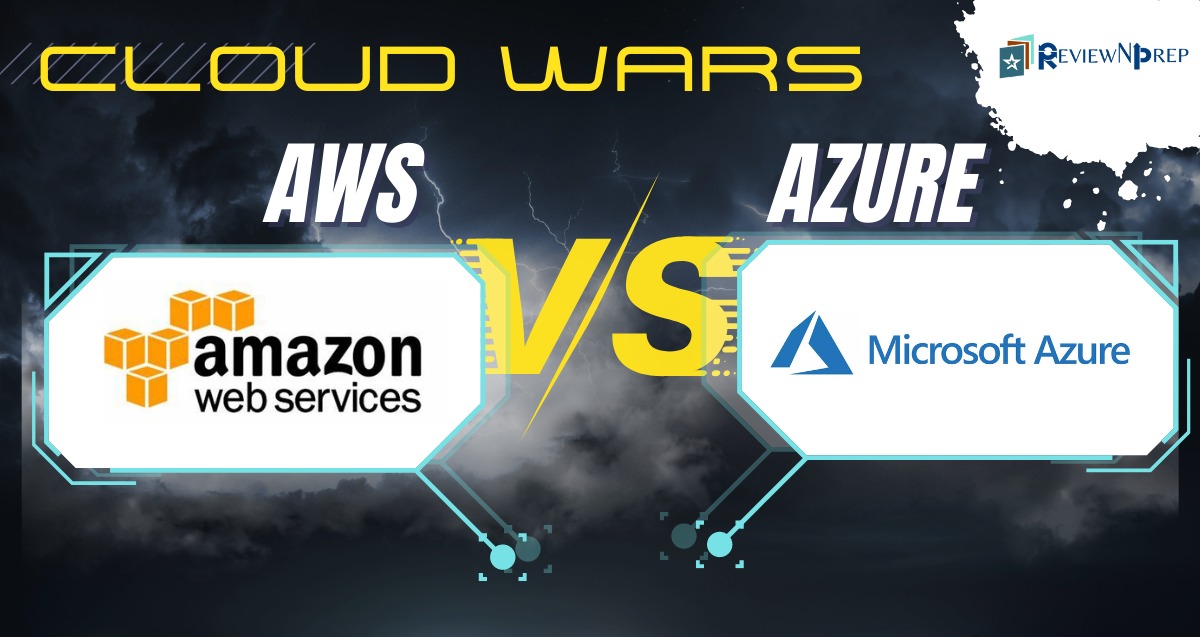|
|
If you are new to the world of cloud computing, it is very important to familiarize yourself with various leading “Cloud Service Providers” before deciding which one is better suited to get started with a career in Cloud Computing.
Because you are reading this blog, we are making an assumption that you are here for one of the following reason:
You wanted to know the differences or similarities between AWS and Azure..
OR
You want to know which cloud provider to start your cloud journey with..
OR
You want to understand which cloud is better suited for your business needs..
Whatever the question might be, our hope is that by the time you are at the end of this blog, you’d have learnt something valuable.
So, let’s get started and talk about the ongoing cloud war between AWS and Azure.
History
Public cloud services, such as Amazon Web Services (AWS), Microsoft Azure, Google Cloud Platform (GCP), and IBM Cloud, are innovation behemoths that offer highly operating cost-competitive alternatives to traditional on-premises hosting environments.
In 2006, Amazon Web Services (AWS) began offering IT infrastructure services to businesses in the form of web services – now commonly known as cloud computing. Their rapid adoption led to a large market share in the early days. Microsoft followed suit by launching Azure on February 1, 2010, which helped them grow as well. In April 2008, Google announced a preview release of App Engine, a developer tool that allowed users to run their web applications on Google infrastructure.
Amazon Web Services (AWS) had an early movers advantage in the public cloud offering. As per Statista, it still is the leader is the leader in the cloud market with 32%. Microsoft is second with 21%, followed by Google Cloud Platform (GCP) with 8%. Alibaba Cloud is next with 5%. As you can see AWS holds the lion share of the cloud computing market. Together these cloud vendors account for 66% of the market share.

While Amazon reports AWS revenue in dollars, Microsoft only shows Azure revenue growth by percentage. Interestingly, Microsoft, reports on a grouping of products that Azure forms called as “Intelligent Cloud. (which includes revenues from SQL Server, Windows Server, Enterprise Services, and others). Regardless, the revenue growth for all cloud providers has been unprecedented in 2021 and would continue to soar in 2022.
Why Cloud Computing?
Before we start, let us understand why behind cloud computing. Below is a quick summary of the reasons to choose cloud:
| Flexibility | Efficiency | Strategic value |
| Scalability: Scale up/down the infrastructure based on the demand. | Accessibility: Cloud-based applications and data are accessible from virtually any internet-connected device. | Control: Cloud service providers manage underlying infrastructure, enabling organizations to focus on application development and other priorities. |
| Storage options: Based on the security needs, companies can choose public, private, or hybrid storage offerings. | Agility: Cloud enables users to get their applications to market quickly. | Automatic Software Updates & Integration: Service providers regularly update offerings to give users the most up-to-date technology. |
| As-a-service option: Organizations can choose between software as a service (SaaS), platform as a service (PaaS), and infrastructure as a service (IaaS). | Back-up and Restore Data: Hardware failures do not result in data loss because of networked backups. | Collaboration: Worldwide access means teams can collaborate from locations all around the globe. |
| Security features: Virtual private cloud, encryption, and API keys help keep data secure. | Cost Reduction: With pay-as-you-go cost structure and usage of remote resources organizations can save on upfront costs. | Total Cost of Ownership: Organizations spend less money than competitors who must devote IT resources to managing infrastructure. |
Azure vs. AWS: Quick Comparison of popular Services
Range of services provided by both AWS and Azure is quite similar. Below is a quick comparison of the most popular services provided by these cloud providers.
Compute Services
| Service Type | AWS | Azure |
| Deploy, Manage, and Maintain Virtual Servers (wide range of predefined instances) | EC2 | Virtual Machine |
| Platform-as-a-service | Elastic Beanstalk | App Service |
| Serverless | AWS Lambda | Functions |
Storage Services
| Service Type | AWS | Azure |
| Object Storage | S3 | Blob |
| Disk/Block Storage | EBS | Managed Disks |
Database Services
| Service Type | AWS | Azure |
| Relational Database | Amazon RDS | SQL Server Database |
| NoSQL Database | Dynamo Db | Document Db |
| Core Analytics | EMR | Azure HDInsight and Azure table |
Content Delivery and Networking Services
| Service Type | AWS | Azure |
| Isolated Network | Virtual Private Cloud (VPC) | Virtual Network (VNET) |
| Global Content Delivery Networks | CloudFront | Content Delivery Network (CDN) |
| Manage DNS Names and records | Route 53 | Traffic Manager, Azure DNS |
| Dedicated Private Network Connection | Direct Connect | ExpressRoute |
Related Blogs:
Azure vs. AWS: Which Cloud solution is the right one for business?
Both AWS and Azure have common set of services (although different names) when it comes to services provided. When comparing services from each of these platforms, it’s important to consider the size and goals of your company, your expected growth rate, and your budget. Below are some noteworthy differences.
Pricing
Pricing models for any of the major cloud providers is often hard to follow. All services follow a different pricing structure based on the usage. However, you can assess the costs incurred by using the pricing calculator provided by the respective vendors.
If you are running your workload on Windows Server using SQL Server, it makes sense to stick with Azure. AWS is 5 times more expensive than Azure for Windows Server and SQL Server. Azure also gives you a lot more flexibility when it comes to short term subscription plans.
Open Source Support
Whether it is Linux or open sourced communities, AWS cloud has extensive support for both of these and Azure is still playing the catch up game.
Hybrid Cloud
With widespread adoption of Microsoft Office Suite, Azure Active Directory, it is ahead of the curve when it comes to hybrid cloud. However, AWS is catching up fast.
Azure vs. AWS: Which certification exam should I choose?
There are plenty of jobs that require you to be certified by Azure, Amazon Web Services (AWS), or Google Cloud Platform (GCP). Azure or AWS certification can really make your resume stand out from the crowd. However, certification alone will not help you get a job. It’s the hands-on knowledge that you end up with if you study for the certificate well enough will get you that dream job.
In terms of popularity, both AWS and Azure go head to head. If you understand one cloud provider, you can easily grasp the other. Job site Indeed has over 16,000 positions that you’d qualify for with an Azure certification. The number for AWS positions is much higher at 29,000 positions. So, if you go by sheer numbers, AWS is the clear winner. So, if you are just starting to learn cloud, go with AWS. Once you have mastered AWS and cleared a few certifications, it will be easy to jump on to Azure.
AWS Certifications Practice Exams and Video Courses Link
Important Links
It is worth noting that Practice Tests would not be a substitute for gaining the real hands-on knowledge. For that it is recommended that you understand the cloud concepts by getting your hands dirty in AWS Console or Azure Portal. Spin up your cloud environments and tear them down as you are done with a topic.
Conclusion
The most popular cloud job roles are cloud architect and cloud engineer. As per job site Glassdoor, the average salary for a Cloud Developer in the United States is $100,465/year. If you want to try either of the cloud platform, both offer free credits to play around in your own sandbox. We would highly recommend you do that to gain familiarity with these cloud providers.
“Cloud Technology” is fast becoming a common term in the application development playbook. With the rising salaries for the cloud engineers it makes sense to jump on the bandwagon, and ride with the tide.
Have questions? Participate in Cloud discussions on our Forums. Click here.

